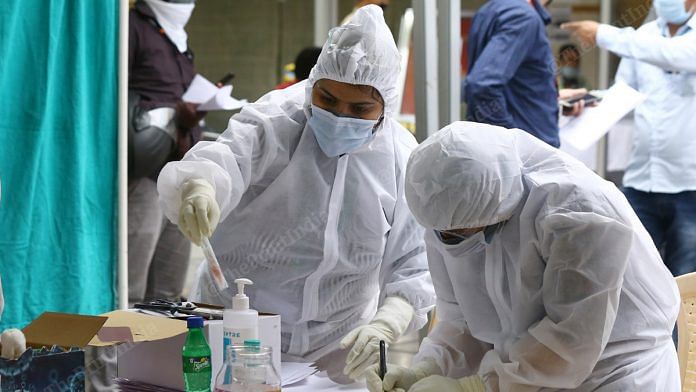New Delhi: After weeks of uncertainty over the testing of confirmed and suspected Covid-19 patients, the Delhi government has decided to increase testing and test patients according to the guidelines issued by the Indian Council of Medical Research (ICMR).
At a meeting between Chief Minister Arvind Kejriwal and Union Home Minister Amit Shah Sunday, it was decided that Delhi would ramp up testing capacity by three times in the next six days. Union Health Minister Dr Harsh Vardhan, Delhi Lieutenant Governor Anil Baijal and Director of All India Institute of Medical Sciences Dr Randeep Guleria were also part of the meeting.
On Saturday, Delhi Health Minister Satyendra Jain said testing “can be opened for all if the ICMR guidelines allow”, and that the “ICMR guidelines need to be altered for testing to increase.” This came days after the Aam Aadmi Party government restricted testing to largely symptomatic contacts of Covid-19 patients —an order that was overturned by Lieutenant Governor Anil Baijal on 8 June.
The Aam Aadmi Party (AAP) government had, in an order dated 2 June, altered ICMR guidelines to rule out testing asymptomatic people, except if they had comorbidities or were over the age of 60.
The government had even barred eight labs — with a combined testing capacity of 4,000 per day — allegedly for violating testing norms. Delhi’s total testing capacity is 8,600 per day.
The government’s turnaround comes days after it was rapped by the Supreme Court for not conducting enough tests.
As of 13 June, Delhi has a total of 38,958 positive cases and 1,271 deaths. It has conducted a total of 2,83,239 tests till date.
Also read: 45% Covid cases in Noida & Ghaziabad tracked to Delhi, can’t open borders, UP tells SC
ICMR testing guidelines
The latest ICMR guidelines, which will be followed by all testing laboratories in the capital city, allow nine categories of people to be tested — symptomatic patients with a travel history and contacts of a Covid-19 positive case, symptomatic healthcare and frontline workers, patients with Severe Acute Respiratory Infection (SARI), asymptomatic direct and high-risk contacts, patients with flu-like symptoms in hotspots/containment zones, hospitalised patients who develop flu-like illness, and symptomatic migrants and returnees within seven days.
These guidelines, which were formulated on 18 May, also state that “no emergency procedure (including deliveries) should be delayed for lack of test”, and a sample can be sent if a patient falls in any of the categories listed above.
The ICMR, which comes under the Ministry of Health and Family Welfare, has maintained that there is no community transmission in the country, even though Jain has said 50 per cent of Delhi’s positive cases are of unknown origin.
Testing labs
Delhi has a total of 40 ICMR-approved testing laboratories, 17 of which are public and 23 private.
“The guidelines for testing have been changed so many times by the state and central governments that it has been a big problem. We have had to turn many people away. For now, we will test in accordance to the ICMR guidelines till further orders,” said a source at Sir Ganga Ram Hospital. “There is no shortage of kits as enough labs are testing now.”
Also read: SC judge makes questionnaire to know steps taken by states to check Covid spread at shelters




“Atop World Health Organization official clarified on Tuesday that scientists have not determined yet how frequently people with asymptomatic cases of Covid-19 pass the disease on to others, a day after suggesting that such spread is “very rare.”
The clarification comes after the WHO’s original comments incited strong pushback from outside public health experts, who suggested the agency had erred, or at least miscommunicated, when it said people who didn’t show symptoms were unlikely to spread the virus.” (sic)
Above is an extract from a news item on WHO.
Who will clarify as ti who is an expert?